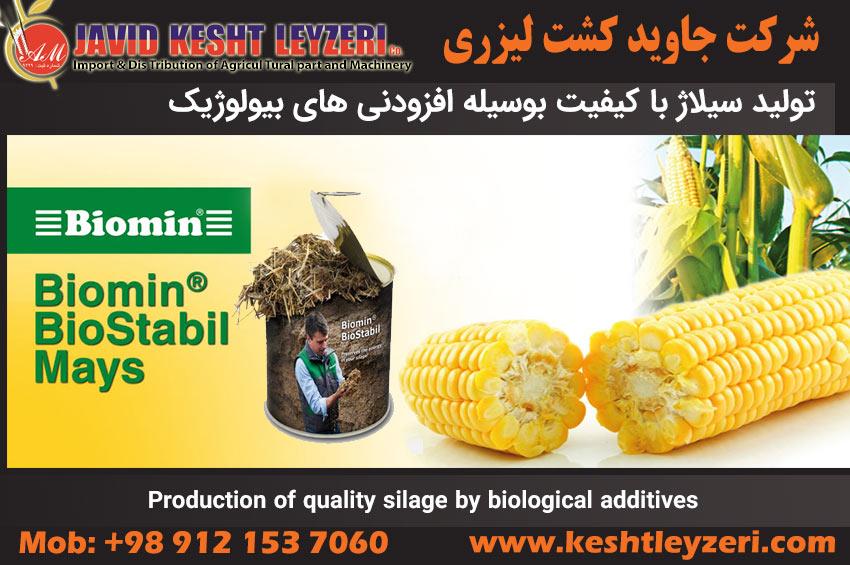
Production of quality silage by biological additives
javid keshtleyzeri Co.ltd
1. By controlling and speeding up the fermentation process (by producing a huge amount of lactic acid)
2. By preventing the continued activity of fungi and microbes that spoil and consume dry silage materials
3. By increasing the degree of silage digestion and maintaining the moisture of the fodder and making the silage tasty.
What is Ecosyl?
It is a biological additive in the preparation of quality silages. It has a very strong strain of Lactobacillus plantarum
Icosyl prevents the conversion of fodder sugar into weaker acids such as butyric acid and acetic acid, water and carbon dioxide, thus preventing energy loss. Ikosyl produces delicious silage due to its abundant lactic acid.
Ikosyl leads to higher production of milk and meat due to the improvement of silage digestibility and preservation of fodder dry matter.
Fermentation of silage is associated with biochemical changes, bacteria and fungi break down the sugar in the forage and turn it into acids, water and carbon dioxide. The most important goal in using biological additives is to shorten the fermentation period and achieve complete fermentation in the shortest possible time.
Caused by silage mold:
Disturbance of the digestive system and production
Abortion and even reduction of estrus symptoms in dairy cows.
Lactobacillus plantarum icosyl has the ability to kill fungi, molds and spoilage microbes as soon as possible.
Ecosyl won the Royal Award of England in 2008. Approved by the German Agricultural Society. Approved by the American FDA. It has the best official university tests in the world, 14 tests in dairy cows, 9 tests in fattening cows, the first additive tested by the Ministry of Agricultural Jihad and registered with the organization. Veterinary medicine under registration number 34/33157 on 22/3/85
Ikosyl is in the form of powder, it is prepared in two sizes in closed plastic bottles for 200 and 50 tons of fodder.
Biomin is biostable
Biomin biostable corn additive is used to increase the population of beneficial bacteria in the silage process of fodder corn. Increasing the population of beneficial bacteria in corn silage reduces the duration of aerobic fermentation and accelerates the creation of anaerobic conditions.
This product contains microorganisms Enterococcus faecium, Lactobacillus brevis, Lactobacillus plantarvium. Also, this product contains inulin, which is considered as a nutrient to start the growth of bacteria in it.
Mechanism of action
The biomin biostable product is a combination of homofermenting and non-fermentation bacteria, which is used to optimize the aerobic and anaerobic stability of fodder silage. This process takes place through rapid and complete silage acidification. Also, the use of this product preserves the quality of the silage after it is opened, which is due to the production of acetic acid by different fermentation bacteria.
The three bacterial species used in this product use the carbohydrates in this fodder source after distributing them on corn silage and convert them into acetic acid and lactic acid. The presence of beneficial bacteria and the lack of access to primary nutrients reduce the chance of the presence of butyric acid producing bacteria, fungi and molds in corn silage. On the other hand, increasing the ratio of lactic acid to acetic acid and reducing the amount of undesirable metabolites such as ethanol, ammonia and butyric acid will improve the quality indicators of corn silage.
Biomin® BioStabil
DSM PERFORMANCE SOLUTIONS
Preserves the energy in your silage
The Biomin® BioStabil product line is a formulation of strategically selected Lactic Acid Bacteria for optimal forage preservation.
These bacteria produce lactic acid and acetic acid in a balanced ratio for an improved fermentation process and longer aerobic stability of silage. The rapid drop in pH value and direct effects of acetic acid inhibit growth of spoilage microorganisms in favor of preserved nutritive value and improved feed safety of silage.
How it Works
BIOMIN developed the Biomin® BioStabil product range tailored to meet our customers’ needs, as a total package for ensiling a full variety of forage crops over a range of dry matter content. Published research on Biomin® BioStabil has shown effectiveness over a wider variety of forages and conditions.
Biomin® BioStabil increases qualitative and nutritional value of the silage and provides superior aerobic stability.
Biomin® BioStabil is easy-to-use, offering excellent solubility. Biomin® BioStabil is non-corrosive and free from genetically modified organisms (GMO-free).
Silage-Ruminants
Main Benefits
Better fermentation
Longer storage life through improved aerobic stability
Higher energy content
Protein preservation
Higher animal productivity and profit
Biomin® BioStabil Plus
Biomin® BioStabil Plus is the flagship of the BioStabil product range. The formulation has the right amount and the right types of homo- and heterofermentative bacteria (Table 1) to deliver all the desired outcomes, including preservation of energy. The formulation contains the rapid growing lactic-acid-producing homofermentative strain L. plantarum DSM 19457, which ensures sufficient lactic acid production for a rapid pH drop in ensiled forage and secures the protection of dry matter, energy and protein losses in the fermentation period.
Biomin® BioStabil Plus also contains L. kefiri DSM 19455 with another selected heterofermentative strain L. brevis DSM 23231, which produce a sufficient acetic acid to provide enhanced aerobic stability in the feed out phase. The combination, containing one homofermentative and two heterofermentative strains also protects against the growth of undesirable bacteria like Clostridia, yeasts and molds during and after ensiling, helping prevent loss of valuable dry matter, energy and protein from the silage.
One reason for providing a range of strains is to help ensure that Biomin® BioStabil Plus is effective on a wide variety of forage types and conditions such as moisture and temperature.






